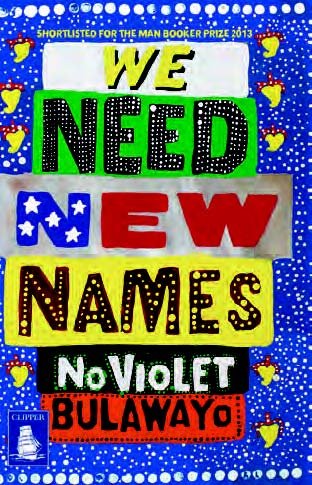
NoViolet Bulawayo (1981- ) was born in and lives in Zimbabwe. She went to the USA for her tertiary education, commencing with a community college in Kalamazoo, Michigan.
Zimbabwe was colonised by the British in 1890, and was known as Southern Rhodesia from 1923 to 1965 and then Rhodesia when the minority white government of Ian Smith declared independence. After extended fighting, the majority Black – mostly Shona – population finally (re)gained control of their own country in 1980 with Robert Mugabe as Prime Minister and, from 1987, President.
Mugabe’s rule was or became authoritarian and the economy went downhill. The implication is mismanagement, but the withdrawal of capital for development is always a major problem for governments rejecting colonial/Western rule.
We Need New Names (2013) is both fictional memoir – of a girl growing up in a shanty town – and quietly but determinedly political. At the beginning the girl, Darling, is 10, and the shanty town, Paradise, is a suburb of a city in an unnamed African country. NVB writes only “our country” and “the leader of our country”, and throughout refers to the collapse of the economy with variations of the phrase ‘things fall apart’, which of course is the title of Nigerian, Chinua Achebe’s first novel.
The novel consists of a series of episodes in Darling’s life, her escapades with her friends, and then later, living with her aunt and attending school in the USA, in Kalamazoo. But underneath is the terrible poverty of ordinary people in “our country”, the unemployment, the flight of qualified professionals to neighbouring countries where they might actually be paid, the collapse of schooling, the collapse of the currency (hyperinflation in Zimbabwe forced the introduction of hard currencies, Rand and US Dollars, for local transactions), the oppression of the people by government security forces.
The first episode is the children, all 10 or 11 – Darling, Bastard, Chipo, Godknows, Sbho, Stina – raiding the backyards of nearby prosperous suburb, Budapest, for guavas, which they eat all through the season, despite the stomach pains they cause, to offset their hunger.
Chipo is pregnant, to her grandfather it turns out, and in a later episode the other girls, Darling, Sbho, and a new friend, unsuccessfully – and knowing very little about what they are doing – attempt an abortion.
We learn Darling’s family had earlier lived an ordinary middle class life in a proper house, but her father’s loss of employment had seen them move to one shanty town, which was bulldozed, and then to Paradise. The father had gone to work in the mines in South Africa; the mother – like the mother in The Famished Road – sells bits and pieces in the market; and Darling is mostly cared for by her grandmother, Mother of Bones.
The father, skin and bones, returns home to die of the ‘sickness’, I guess AIDS.
In one episode the security forces kill a local rebel, BornFree, and the children climb a tree in the cemetery to observe the funeral; and in another, they are up a guava tree in a Budapest backyard when security forces or vigilantes seize the white occupants.
Then, quite suddenly, Darling is living in Detroit, and subsequently, Kalamazoo, Michigan with her aunt Fostalina, her cousin TK and the aunt’s partner, Kojo who is Ghanaian (and therefore can’t understand Darling and Fostalina if they speak the language of their country).
Darling does well at school; makes friends with two other girls, Marina, a Nigerian, and Kristal, African American; they watch porn, go to the mall, Darling gets jobs in a grocery store and cleaning. The family have an adventure driving from Kalamazoo to South Bend, getting lost in the cornfields after Kojo leaves the I94. But we never lose our focus on back home.
How They Lived
And when they asked us where we were from, we exchanged glances, and smiled with the shyness of child brides.
They said, Africa? We nodded yes.
What part of Africa? We smiled
Is it that part where vultures wait for famished children to die? We smiled
Where the life expectancy is 35 years? We smiled
Is it there where dissidents shove AK47s between women’s legs? We smiled
Where people run about naked? We smiled
That part where they massacred each other? We smiled
Is it where the old president rigged the election, and people were tortured and killed, and a whole bunch of them put in prison and all. There where they are dying of cholera? Oh my god, yes. We’ve seen your country, it’s been on the news.
And when these words tumbled from their lips like crushed bricks, we exchanged glances again and the water in our eyes broke, our smiles melted like dying shadows, and we wept, wept for our blessed country. We wept and wept and they pitied us and said it’s ok, you’re in America now.
Fostalina and Darling attend to an old man from their country, in an old people’s home, who has lost any English he might have had and who imagines himself back, leading his people.
Darling phones her mother but the phone is picked up by Chipo, who is angry that Darling has lost contact with her friends and tells her that she no longer belongs.
In the last chapter Kojo tells Darling Osama Bin Laden has been found and killed, reminding her of the game ‘searching for Bin Laden’ she had once invented and played back home, and incidentally dating the end of the novel at 2011, implying Darling was born in say 1993, making her a decade or so younger than the author.
We Need New Names is so much more than a coming of age – a great novel and a worthy Booker shorlistee.
.
NoViolet Bulawayo, We Need New Names, Little Brown, 2013. Audible version read by Robin Miles. 9 hours.






















